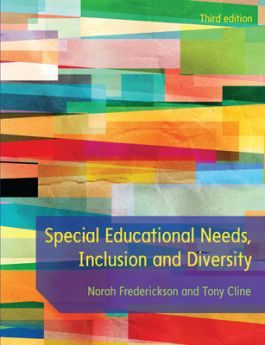Special Educational Needs, Inclusion and Diversity
Receive via shipping:
- Colour, print bound version of the complete text
Acknowledgements
PART ONE Principles and concepts
Special educational needs, inclusion and diversity: an integrated approach
Stakeholders in special educational needs and inclusion
Concepts of special educational needs
Inclusion
Special educational needs: developmental frameworks
PART TWO Assessment in context
Identification and assessment
Bias and equity in assessment
Assessment for learning
Learning environments
PART THREE Areas of need
Language
Autism spectrum disorders
Learning difficulties
Literacy
Mathematics
Behaviour in school
Emotional, social and mental health needs
Sensory needs
Physical needs
References
Index
Special Educational Needs, Inclusion and Diversity 3E has established itself as the textbook on special educational needs (SEN). The new edition of this popular textbook retains its comprehensive, insightful and accessible approach and reflects the latest changes in policy and legislation. It provides a stimulating balance between theory, research and practice as well as a unique analysis of the implications for SEN of linguistic, cultural and ethnic diversity.
Recognizing the complex and difficult nature of many special educational needs, the authors place a firm emphasis on inclusion and suggest practical strategies enabling professionals to maximise inclusion while at the same time recognizing and supporting diversity.
Key features of the third edition include:
• The increasingly diverse SEN approaches and legislation across England, Wales, Scotland and Ireland, within an
international context
• Provision and arrangements for 16-25 year olds
• Identification, assessment and intervention strategies for SEN from the early years
• Responding to the diversity of social, emotional and mental health needs within the context of behaviour and discipline in
schools
Special Educational Needs, Inclusion and Diversity 3E is the definitive handbook that supports teachers, educational psychologists, SENCOs, SEN specialist teachers and other professionals in working with children who have SEN in an increasingly diverse society.

